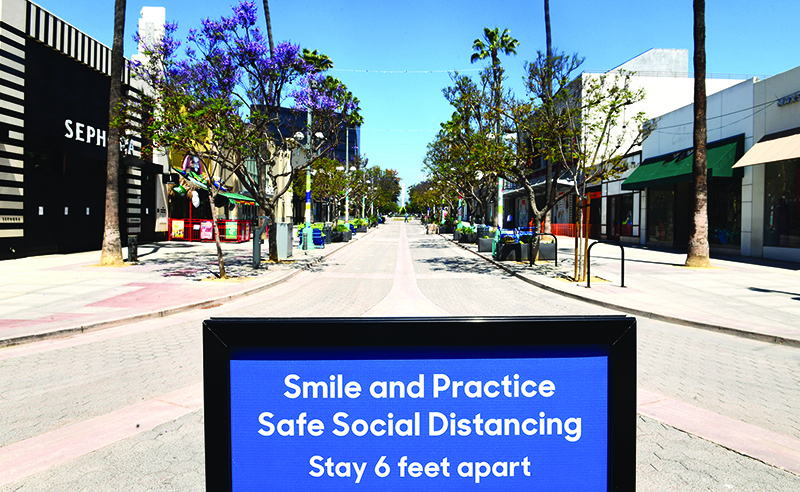
LOS ANGELES: Millions unemployed, world-famous tourist attractions closed, movie sets shuttered and a huge deficit looming: California has been among the states hardest hit by the pandemic economically. Before the coronavirus struck, the Golden State had been growing at a faster pace than the rest of the country for an entire decade.
But when stay-at-home orders were announced in March, earlier than similar measures elsewhere across the nation, the economy—heavily dependent on tourism, hospitality and entertainment—took a sharp nosedive. As businesses from shops and restaurants to amusement parks such as Disneyland closed, unemployment shot from negligible levels to 24 percent, well above the national rate of 15 percent and closer to the state’s Great Depression peak.
Having paid out nearly $19 billion in unemployment benefits, with the assistance of federal loans, California now faces a $54 billion deficit. That means cuts to school, social, health and infrastructure programs.
“COVID-19 has caused California and economies across the country to confront a steep and unprecedented economic crisis—facing massive job losses and revenue shortfalls,” Governor Gavin Newsom said two weeks ago. Lockdown restrictions are now starting to ease, with some 70 percent of the state’s $3 trillion economy allowed to resume operations under strict social distancing measures, according to the governor. Still, business remains chronically low and may remain so as long as consumers lack confidence that the virus is under control, said Tom Steyer, the former presidential candidate who heads California’s economy recovery commission. “For this economy to work... people need to feel safe,” he said in a radio interview.
“You’re not going to go shopping if you don’t think it’s safe. You’re not going to go to work if you don’t think it’s safe.
Technology
But experts believe the state’s diverse economy—the world’s fifth-largest—can still bounce back to lead the United States’ recovery. With an economy larger than Great Britain’s, California represents 14.5 percent of the entire nation’s GDP.
The state of 40 million people contains international tech powerhouse Silicon Valley, as well as Hollywood’s sprawling entertainment industry. The hi-tech sector provides reasons for optimism, according to Jerry Nickelsburg, economics professor at University of California Los Angeles, who predicts future manufacturing will favor “locations where there is a concentration of engineers and scientists.” California’s “very strong and vibrant tech sector” is expected to “grow and to lead us out of recession,” he added.
“That means California, especially in the high income sectors, will be growing more rapidly than the (rest of the) US.” But not everyone is so bullish. Steyer has warned the technology sector may not be enough to compensate for “free fall” in other parts of the economy, according to the New York Times.
These include massive lost agricultural harvests, empty hotels and wine tasting rooms, and venues from sport stadiums to concert halls like the Hollywood Bowl canceling their entire summer programs.
California’s oil-producing cities have also been crippled by the collapse in global oil prices.
And Los Angeles’s massive ports have seen a 15 percent drop in volume this year, driven by the China trade war as well as pandemic measures. “California has been and will be a key component of the world economy,” said Stephen Cheung, former global trade director at the Port of Los Angeles. “Many folks will look carefully... because there are so many different microcosms here that represent the world.”
“We’re not going back to January of 2020,” added Steyer. “We want to have a more sustainable, a more forward-looking California so that we go through this very, very difficult and painful time and come out with something better.” – AFP









